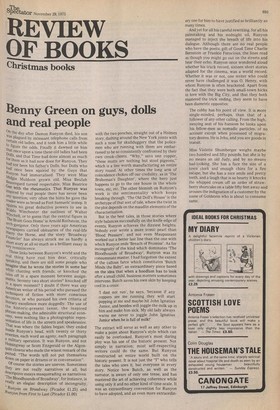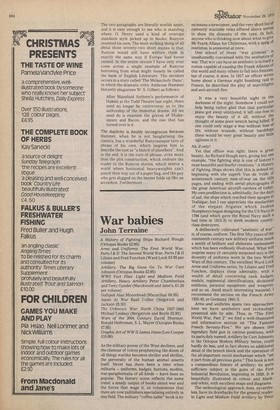REVIEW OF BOOKS
Christmas books
Benny Green on guys, dolls and real people
Oh the day after Damon Runyon died, his son was plagued by incessant telephone calls from Certain old ladies, and it took him a little while to figure the odds. Finally it dawned on him that once upon a time these old ladies had been palls, and that Time had done almost as much for them as it had now done for Runyon. They ,had not been his father's Dolls, but Dolls who nad once been squired by the Guys that ,_ktlrlYon had immortalised. They were Miss' wiltlgie Muldoon grown old, Miss Beulah Reauregard turned respectable, Miss Beatrice ee with the rheumatics. That Runyan was Inspired by real people there has never been any question; very often the hints he gave the reader were as broad as Feet Samuels' instep. It reuires no great deductive powers to see in wWaldn Winchester the outlines of Walter .",,Inchell, or to guess that the central figure in The Brain Goes Home' is Arnold Rothstein, the arch-gangster. Only three years ago American newspapers carried obituaries of the real-life Financier, the Horse, and the story 'Broadway rinancier, has always struck me as hardly a short story at all so much as a brilliant essay in wrY reminiscence. These links between Runyon's world and the real thing have cost him dear, critically .sPeaking, and there are still some people who anagine that he wrote the stories in some bar While chatting with friends, or knocked the tales off in a spare moment between assignents. Seventy two short stories* knocked off In a spare moment? I doubt if there was any AMerican writer of his period who pursued the techniques of fiction with more conscious levntion, or who pursued his own criteria of literary excellence more doggedly. The use of the historic-present tense, the inspired Phrase-making, the admirable structural econ°MY, were nothing like a photographic representation of life in the streets and speakeasies. That at was where the fables began; they ended Inside Runyon's head, with twenty or thirty rewrites each word an agony, each paragraph a military operation. It was Runyon, and not Hemingway or Scott Fitzgerald or the Algonquin clowns who made the wisest remark of the Period: "The words will not put themselves cl°wrl on paper in dreams or in conversation". Of course the stories are uneven. Sometimes they are not really narratives at all, but escriptive essays masquerading as narratives. The Bloodhounds of Broadway', for instance, is really an elegiac description of incongruity,
* Runyon on Broadway (Picador 61.25) and Runyon from First to Last (Picador £1.00) with the two pooches, straight out of a Holmes story, dashing around the New York joints with such a nose for skullduggery that the policemen who are running with them are embarrassed to be so consistently confronted by their own crook-clients. "Why," says one copper, "these mutts are nothing but stool pigeons," which is a line worth manufacturing an entire story round. At other times the long arm of coincidence chokes off our credulity, as in 'The Brakeman's Daughter', where the hero just happens to go to the one house in the whole town, etc, etc. The other blemish on Runyon's work is the sentimentality which keeps breaking through. 'The Old Doll's House' is the archetype of that sort of tale, where the twist in the plot depends on the maudlin elements of the characterisation.
But in the best tales, in those stories where style balances successfully on the knife-edge of events, Runyon achieves the dizziest heights. Nobody ever wrote a more ironic pearl than 'Blood Pressure', and not even Maupassant worked out a better last line than the one with which Runyon ends 'Breach of Promise'. As for incongruity of the kind which dominates `The Bloodhounds of Broadway', Runyon was its consummate master. I had forgotten the extent of the callous farce which constitutes 'Butch Minds the Baby', an extraordinary piece based on the idea that when a hoodlum has to look after a small child, business matters sometimes intervene. Butch saves his own skin by keeping cool in a crisis: 'I dast not run', he says, 'because if any coppers see me running they will start popping at me and maybe hit John Ignatius Junior, and besides will joggle the milk up in him and make him sick. My old lady always warns me never to joggle John Ignatius Junior when he is full of milk!'
The extract will serve as well as any other to make a point about Runyon's style which can easily be overlooked. Runyon's most daring ploy was his use of the historic present. Not simply in narration; most self-respecting writers could do the same. But Runyon constructed an entire world built on the historic present. It is not just the "I" who tells the tales who uses it, but everyone in every story. Notice how Butch, as well as the narrator, is aware of only one tense, and has mastered the art of achieving coherence while using only it and no other kind of time-scale. It was an extraordinary convention for Runyon to have adopted, and an even more extraordin ary one for him to have justified so brilliantly so many times.
And yet for all his careful rewriting, for all his painstaking and his midnight oil, Runyon managed to inject the breath of life into his dialogue. Although there are no real people who have the poetic gift of Good Time Charlie Bernstein or Frankie Ferocious, the lines read as though you might go out on the streets and hear their echo. Runyon once wondered aloud whether his track record, sixteen short stories adapted for the cinema, was a world record. Whether it was or not, one writer who could never have challenged it was O. Henry, with whom Runyon is often bracketed. Apart from the fact that they were both small-town hicks in love with the Big City, and that they both mastered the trick ending, they seem to have been diametric opposites: The cabby has his point of view. It is more single-minded, perhaps, than that of a follower of any other calling. From the high, swaying seat of his hansom he looks upon his fellow-men as nomadic particles, of no account except when possessed of migratory desires. He is Jehu, and you are goods in transit.
Miss Violette Shumberger weighs maybe two hundred and fifty pounds, but she is by no means an old Judy, and by no means bad-looking. She has a face the size of a town clock and enough chins for a fire escape, but she has a nice smile and pretty teeth, and a laugh that is so hearty it knocks the whipped cream off an order of strawberry shortcake on a table fifty feet away and arouses the indignation of a customer by the name of Goldstein who is about to consume same. The two paragraphs are literally worlds apart, and it is easy enough to see who is standing where. 0. Henry used a kind of overripe mandarin style picked up in books; Runyon invented his own. The most striking thing of all about those seventy-two short stories is that Runyon would still have written, them in exactly the same way if Europe had never existed. In the entire oevure I have only ever come across a single example of Runyon borrowing from what might loosely be called the bank of English Literature. The incident occurs M a story called 'The Melancholy Dane', in which the dramatic critic Ambrose Hammer blatantly plagiarises W. S. Gilbert as follows: After Mansfield Sothern's performance of Hamlet at the Todd Theatre last night, there need no longer be controversy as to the authorship of the immortal drama. All we need do is examine the graves of Shakespeare and Bacon, and the one that has turned over is it.
The duplicity is doubly incongruous because Hammer, when he is not burglarising the classics, has a wonderful Runyonesque turn of phrase of his own, which inspires him to describe the cast as "a bunch of plumbers". And in the end, it is the turn of phrase, even more than the plot construction, which endears the reader to the Runyon stories, which mirror a world where horizontal heavyweights can't punch their way out of a paper bag, and the guy who gets slugged on the beezer folds up like an accordion. Furthermore .. .



































 Previous page
Previous page